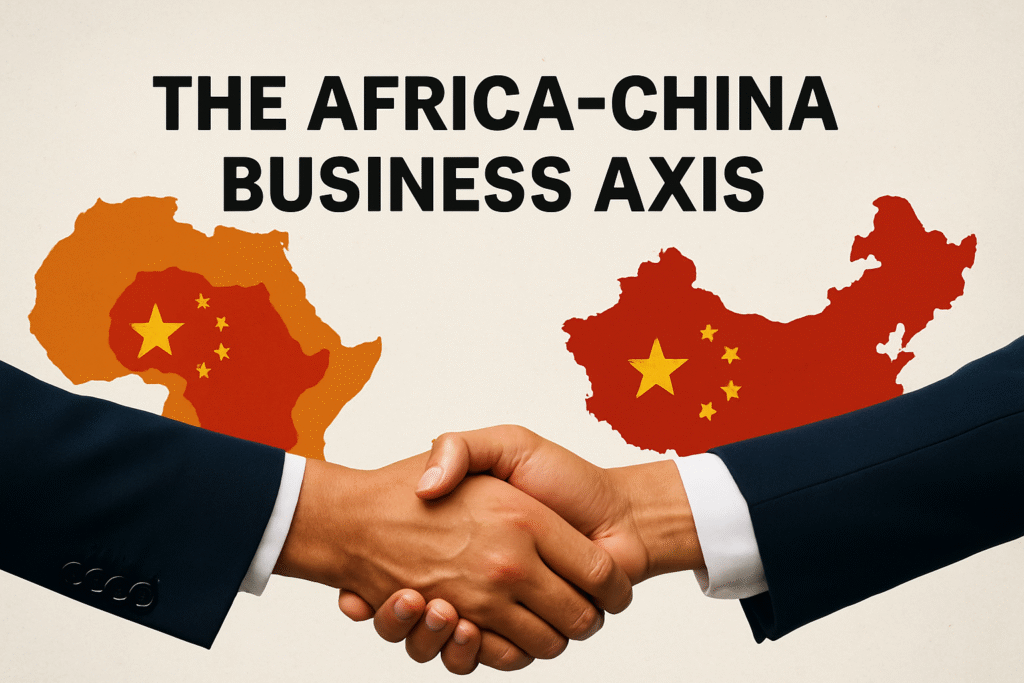The Unstoppable Rise of the Africa-China Business Axis—and Why the West Should Worry

A business handshake set against the maps of Africa and China, highlighting the expanding Africa-China business axis in 2025.
Somewhere between Beijing’s fast-tracked port deals and Nairobi’s growing skyline, a quiet transformation is underway—one that much of the West is still trying to interpret.
It’s not new. But it is deeper than before.
The Africa-China business axis has shifted from a curiosity into a powerful force—economic, political, and increasingly technological. While Western powers debate policy frameworks and long-term strategies, China has simply been doing business. And for many African nations, that pragmatism has been hard to ignore.
While Western headlines often focus on tensions in the Pacific or debates over AI, a quieter—but equally significant—realignment is taking place across Africa. The Africa-China business axis has evolved into a powerful force, reshaping trade, infrastructure, and diplomacy throughout the continent. Unlike Western institutions burdened by red tape and conditions, China’s approach is fast, transactional, and deeply embedded. From digital networks to industrial zones, the results are tangible. Yet many Western policymakers still underestimate the scale of this shift—treating it as peripheral, when it’s anything but. This axis isn’t emerging. It’s already here—and growing stronger by the day
Table of Contents
The Real Work Is Already Happening
Fly into Addis Ababa or Lagos, and you’ll see the footprints everywhere—roads laid by Chinese firms, trains financed through low-interest loans, new industrial zones coming up with barely a press release in the Western media. China doesn’t always send diplomats to Africa anymore. These days, it sends contracts.
Trade between the two regions has been climbing steadily. In 2024, it crossed $300 billion. But it’s the shift in how they trade that says more. China no longer sees Africa just as a source of raw materials. Increasingly, it’s treating African cities as growth markets—places to invest in manufacturing, fintech, logistics, even education.
For Western economies still trying to “re-engage” with Africa, this isn’t just a missed opportunity. It’s a strategic blind spot.The Africa-China business axis is no longer confined to raw material exports. It’s evolving into a two-way commercial lifeline, with African economies diversifying and integrating deeper into China’s global trade routes. This shift proves the Africa-China business axis is more than a trend—it’s a deliberate strategy transforming how emerging markets engage with world powers.
Infrastructure Without Apologies
Yes, the roads and bridges are still part of it. So are the power plants, airports, rail networks. But this isn’t the aid-based development model Western countries know. It’s commercial. Fast. Often without long public debates.
Critics in Europe and the U.S. often call it “debt-trap diplomacy,” pointing to loans that come with repayment risks. But if you ask local officials in Nairobi or Accra, most will tell you the same thing: what matters is that things get built.
Sure, there are issues. Not every deal is transparent. Some projects do run over budget or under expectations. But for many African leaders, China’s offering is refreshingly clear: infrastructure now, payment later. No lectures, no strings about governance or elections.
It’s not idealism. It’s utility.
Building Africa’s Digital Backbone
This axis isn’t limited to cement and steel. The next front is digital, and here too, China is miles ahead.
Huawei equipment runs the backbones of many African telecom networks. Chinese phones dominate the market—not just because they’re cheap, but because they’re good. Behind the scenes, data centers and national ID programs increasingly rely on Chinese software or engineers.
There’s discomfort about that in Washington. Allegations about surveillance, privacy risks, authoritarian tools. But from the perspective of many African governments, what China is offering is functionality. And that functionality is arriving faster than alternatives from the West.
Tech, like roads, is being chosen based on who delivers first—and who asks fewer questions.
Politics, Quietly
There’s another layer to this Africa-China business axis: diplomacy. And it’s changing faster than most realize.
In global forums, Africa’s voice is becoming more aligned with China—at least in tone. At the United Nations, African votes are more often neutral or silent on issues that pit the West against Beijing. Is that loyalty? Not really. It’s leverage.
African countries aren’t passively choosing sides. They’re choosing opportunities. And in 2025, those opportunities are coming more often from the East.
You may also like BRICS Challenging the U.S. Dollar in 2025: The Quiet Shake-Up of Global Finance
The Local Shift the West Doesn’t See
What many in the West miss entirely is this: African entrepreneurs are now shaping this axis too.
Mandarin-language programs are growing in Ghana and Rwanda. In Nairobi, young business owners pitch ideas to Chinese investors as comfortably as they would to Silicon Valley VCs. Logistics firms in Lagos are optimizing for Chinese shipping patterns. This isn’t about dependency. It’s co-creation.
If anything, it’s the West that feels outdated—more focused on frameworks than relationships.
What the Africa-China business axis ultimately represents is a rebalancing of influence. It’s not just about China gaining ground; it’s also about Africa asserting agency. In this new global dynamic, the Africa-China business axis is helping rewrite the rules of trade, diplomacy, and development on African terms—something long overdue.
So What Comes Next?
It’s tempting to reduce this to a rivalry—China vs. the West, influence for influence, loan for loan. But that’s not how it looks from the ground.
For African nations, the China partnership isn’t about ideology. It’s about access, speed, and growth. And unless Western countries can offer the same—without the bureaucracy and baggage—they’ll keep playing catch-up.
The Africa-China business axis didn’t emerge because African governments were fooled. It emerged because too many Western governments assumed they’d always be the preferred choice.
They aren’t anymore. And maybe, they never really were.
You can also read article on The China-Africa Axis in Relation to Other Regional Axes



